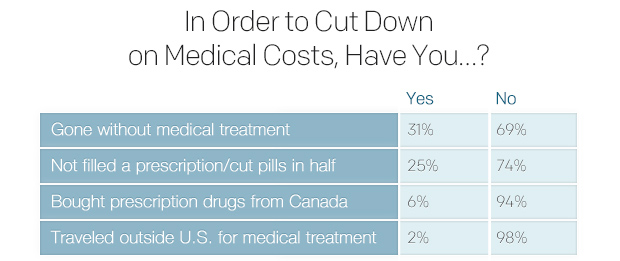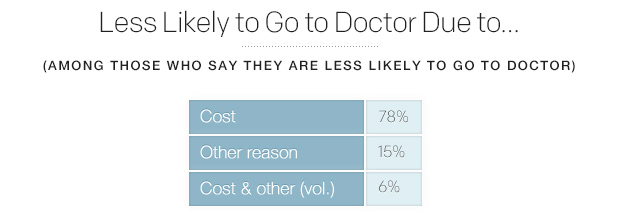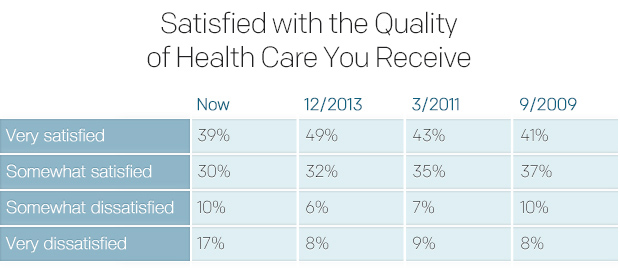Do Americans think their health care costs are affordable?
Sarah Dutton, Jennifer De Pinto, Anthony Salvanto and Fred Backus
The Cost of Health Care
Fifty-two percent of Americans say they find basic medical care affordable, but that's down from 61 percent last December. Today, for 46 percent of Americans, paying for medical care is a hardship, up 10 points.
Similarly, just over half of Americans are at least somewhat satisfied with their health care costs, while 43 percent are dissatisfied.
Americans are feeling the cost of their health care. Fifty-two percent say the amount of money they pay for out-of-pocket health care costs -- those not covered by insurance -- has gone up over the past few years, including a third who say those costs have gone up a lot.
Most attribute the rise of out-of-pocket costs to more expensive medical treatment, rather than an increase in the amount of treatment they are receiving.
Even though a majority of Americans are able to keep up with their medical costs, some cannot. Thirty-seven percent say they or one of their immediate family members have had trouble keeping up with their medical bills in the last few years. Those with lower incomes are more likely to have had trouble paying their medical bills.
In addition, 28 percent of Americans say they been contacted by a collection agency because of medical bills. And among those who have had trouble paying their medical bills, nearly two-thirds have been contacted by a collection agency.
Some Americans have also received medical bills they weren't anticipating. Forty-eight percent say that over the last few years say they have received medical bills for amounts that were larger than expected or for services they didn't expect to be billed for. This is especially true for those who describe their health as in fair or poor condition.
Trying to Cut Medical Expenses
When Americans are asked about some specific ways they may have tried to cut down on their medical expenses, nearly a third (31 percent) say they have gone without medical treatment because of the cost, and a quarter (25 percent) have not filled a prescription or have cut pills in half. Few have bought prescription drugs from Canada (6 percent) or have traveled outside the U.S. for medical treatment (2 percent).
For most Americans, the frequency with which they go to the doctor when they are sick hasn't changed much over the last few years, but a quarter are less likely to go, and that figure rises to 35 percent among those who report their out-of-pocket health costs have increased. Americans cite cost as the reason they are less likely to see a doctor when they are injured or sick.
Most Americans (eight in 10) say their doctor should discuss the cost of medical treatment with them ahead of time.
How often does their doctor actually talk about cost? Fifty percent of Americans say their doctor discusses how much treatment will cost ahead of time almost always or sometimes, but 49 percent say their doctor hardly ever or never does this.
Even though some Americans express concern about their health care costs, most remain satisfied with the quality of it. Nearly seven in 10 are at least somewhat satisfied with their health care quality, although satisfaction has dropped in the last year.
Health Care Policy
A majority of Americans favor a government-administered health insurance plan like Medicare for everyone, but support drops when asked about a single-payer health insurance system funded by taxpayers.
Fifty-nine percent of Americans support offering everyone a government-run health plan like Medicare. Throughout the debate on health care reform in 2009, before the Affordable Care Act was enacted, majorities backed this type of health care system. It is supported by Democrats (83 percent) and independents (55 percent) but opposed by Republicans (61 percent).
But there is less support (although it's still sizeable) for a single-payer system, in which all Americans would get their health insurance from one government plan financed by taxes. Forty-three percent favor such a system, while 50 percent oppose it.
As for the 2010 health care law, previous CBS News Polls have shown more Americans disapprove than approve of it, which has been the case since 2010 when it was first passed.
-----------------------------------------------------------------------------------------------------
This poll was conducted by telephone December 4-7, 2014 among 1,006 adults nationwide. The error due to sampling for results based on the entire sample could be plus or minus three percentage points. The error for subgroups may be higher.
Data collection was conducted on behalf of CBS News and The New York Times by SSRS of Media, PA. Phone numbers were dialed from samples of both standard land-line and cell phones. Interviews were conducted in English and Spanish. This poll release conforms to the Standards of Disclosure of the National Council on Public Polls.




